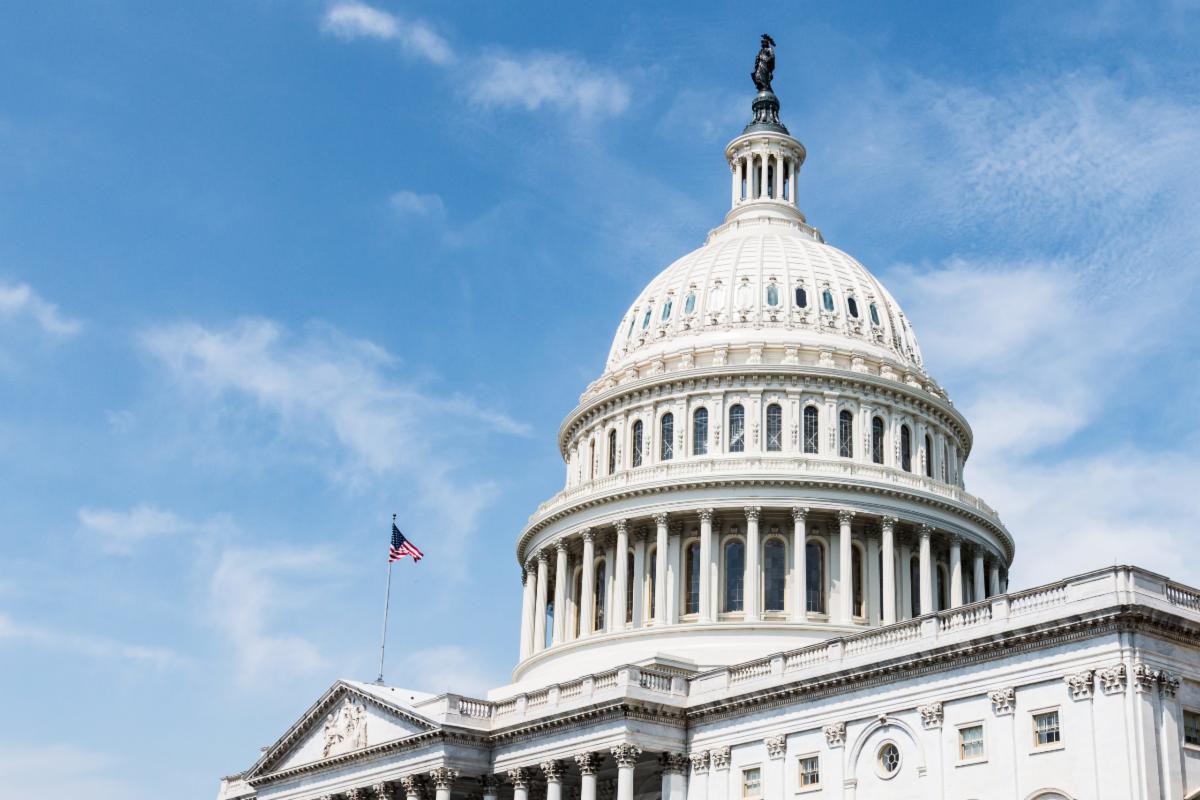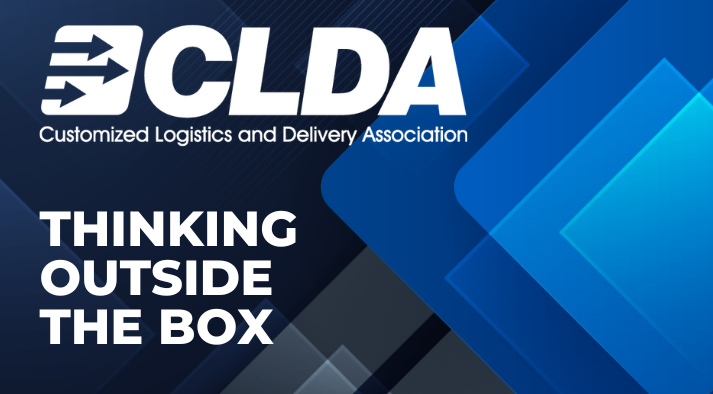
Home | News






CLDA Members are encouraged to share news about their company. CLDA may share on social media, in newsletters or the Customized Logistics & Delivery Magazine.

Ready to share your news with CLDA or the industry media? Learn from these tips and tricks on how to get noticed.

WASHINGTON, DC., Feb. 7, 2022 — What can providers learn from today’s disrupted supply chain? And how can they use those lesson to re-engineer today’s flawed supply chain? Two logistics veterans say it’s all about taking in those lessons and using them to change the ways goods flow through the system.
“Supply chain disruptions have become our new normal, and we should expect and plan for them in the foreseeable future,” says Chuck Moyer, a 40+ year logistics veteran and a former president of the Customized Logistics & Delivery Association (CLDA). CLDA’s 2,900 members include logistics professionals, carriers, shippers, drivers, air cargo logistics providers, 3PLs and vendors servicing supply chain companies. Moyer is currently Chief Executive Officer at Pentagon Final Mile & President at ROVA (Transportation Platform Company).
Adam Hill, President & Chief Operating Officer for the Scarbrough Group of Companies agrees that disruptions are here to stay, at least for the near future: “I expect us to see a least another year of this. I think 2022 is going to give us a little bit of a reprieve but I don’t think we’re going to see anything approaching ‘normal’ until sometime in 2023. And even then, I think we’ll need a new definition of normal.” The Scarbrough Group is a full-service international and domestic logistics provider, and a U.S. and Mexican Customs Broker. The group includes Scarbrough International, Scarbrough Logistics, Scarbrough Transportation, Scarbrough Consulting, and Scarbrough Warehousing.
A Flawed System That Finally Broke
Moyer points out that none of the current disruptions are especially new. Many industry observers have pointed out just how frail the supply chain was, even before the pandemic. “Many of the systems in use are antiquated, lack supply chain visibility and the ability for proactive planning.”
Moyer also pointed out that there were pre-existing weaknesses in the supply chain that finally gave way when faced with rising consumer expectations intensified by the pandemic. “What’s happening now only exposed the weaknesses in the supply chain,” he says, “Everyone in the supply chain knew the ports and labor models were fragile. It’s been reported and discussed for many years. What happened with the pandemic just exposed what was already know and the lack of planning. There were problems below the surface, and they just hadn’t reached the breaking point yet. We’ve been talking about these issues forever, but very few companies have really done a good job preparing and taking a proactive approach in dealing with them.”
It Didn’t Start With the Pandemic
Both of these logistics pros saw the roots of today’s issues preceding the pandemic by decades. One of the big drivers was the change in consumer expectations. “It goes all the way back to FedEx and Amazon. They changed consumer expectations,” says Moyer. “Before that, the delivery companies would tell the consumer when to expect their orders (known as the “push model”). Then companies like FedEx and Amazon started to put that power into the hands of the consumer (known as the “pull model”). Changing from the shipper telling the consumer ‘Your package will be delivered in three weeks’ turned into empowering the consumer and shippers asking consumers ‘When would you like it delivered?’ That put stress on the entire supply chain and is here to stay. The expectation of fast delivery, shipment tracking, excellent customer service combined with a flexible return policy and free or low-cost delivery options has everyone reevaluating their solutions.
Hill pointed out that another of the big weaknesses in the supply chain can be traced back to the Recession in the early 2000s. “We’re going have to go all the way back several decades to get a full picture of where we are now.”
The Pandemic Domino Effect
When COVID hit in China, cancelling Chinese New Year celebrations in 2020, the final stressor on the supply chain fell into place. “China was locked down for nine weeks due to the virus,” points out Hill. “Factories were shut down. Production ceased. That caused the steam ship lines to stop servicing those ports. Then, COVID started making its way around the world. Europe shut down. The US shut down. And just as manufacturing in China picked up again, we started to see skyrocketing consumption in the US fueled by lockdowns. Fast forward now and we’re seeing the ports in LA and Long Beach trying to handle a 30-plus percent increase in traffic from their pre-pandemic numbers. Those goods are locked up even now as things ease a bit, but it’s still chaos. The warehouses on the coasts are 130% full. We have more than 20 loads for every individual truck that’s available to come out on the West Coast. It’s just a perfect storm of problems. In the past, we may have had one of these problems and the rest of the supply chain could figure a way around it. We can’t do that now. That’s why I describe what’s happening as chaos. Not disruption. Chaos.”
What Can We Do?
“Disruptions are ongoing and somewhat unpredictable but planning now and changing the way we do business will position companies to take advantage of those disruptions in the future, and gain market share” says Moyer.
Given that many of the supply chain issues are baked into the system, what can logistics providers do? Moyer advises getting as much visibility of the whole process as possible. “When I look at the supply chain issues of today, I believe the root cause is that most companies lack visibility and measurements in their supply chain. What they need is a Control Tower – a way to gain full visibility all the way from the manufacturing of the goods through every leg of the supply chain. That way everyone along the way can spot disruptors in real time and adjust. So, if manufacturing is ahead or behind in their schedule, those picking up the goods can modify their schedules and judge the impact on their warehouses and ultimately how and when they will be able to deliver goods to their destinations. Having real-time systems that are linked to all of your stakeholders, monitors weather, and industry issues (including labor and bottlenecks) will help everyone in the supply chain to plan accordingly. This will allow optimization of every component in the supply chain. If you have that Control Tower you can optimize everything from your agreements to your scheduling, insurance, inventory control, placement of facilities and adjust as needed and keep your customers informed. Creating a pro-active culture and solution is an investment and provides a distinct advantage and ROI”.
Hill points to the human side of the equation when it comes to coping with disruptions in the supply chain. “Partnerships matter. Providers need to do business with people who are like-minded. They must do business with people they trust and know they can depend upon. This is the time where service wins and good partnerships are how you provide a high level of service. The world relies on those of us who make the supply chain work and we need to work together to make that happen.”
When it comes to providing the best service, Hill says that communications are key. “Many of these disruptors will be with us for a very long time and if we’re going to keep our customers it’s going to be all about communication. Communication skills are the key to delivering good service, no matter what disrupts the process. And when those things hit, servicing the client may include having to tell them that something’s not going to happen. Providers will need to be honest when something’s gone wrong and offer solutions to the customer how they’ll take care of it.”
Lastly, Moyer advises that everyone in the supply chain will need to evaluate how they do things. “We’re going to have to streamline operational strategy at every stage of the supply chain,” he says. “That will include improving manufacturing and inventory control, evaluating carrier relationships, searching out vendor management solutions, modifying demand requirements and focusing on workplace environments. Companies will need to invest in their people, artificial intelligence, automation and analytics to find creative solutions to streamline tasks, improve forecasting, gain visibility and improve efficiency. These are complex issues and companies must put strategies in play today and not just hope that the issues will resolve themselves. They won’t.”
Opportunity From Chaos
Hill concludes his observations about disruptions in the supply chain on a positive note. “There are always opportunities created by chaos,” he says. “Find the right opportunity and look for ways to make the most of it. There will always be storms and those that figure a way to make the most of them will come through stronger.”
Looking for ways to flourish in the midst of supply chain disruptions? Turn to the CLDA for webinars, conferences, best practices and support from members in the industry. Contact the association at info@clda.org or visit their site at clda.org.
About the Customized Logistics and Delivery Association
The Customized Logistics and Delivery Association (CLDA) represents the first to final miles of the supply chain in the US and worldwide. This non-profit professional association serves the needs of its 2,900 essential service members who are logistics professionals, carriers, shippers, drivers, air cargo logistics providers, 3PLs and vendors servicing today’s supply chain companies. The CLDA gives its members access to a diverse network of logistics professionals looking to create new business opportunities and share decades of practical insights. They provide an avenue for amplifying members’ voices on key issues and helps them participate in the regulatory discussions shaping the industry. The CLDA keeps members informed and educated on trends, current issues and best practices. For more information see www.clda.org.
Media Contact
Andrea Obston
aobston@aomc.com
(860) 803-1155 – cell
WASHINGTON, D.C., Jan. 20, 2022 – The 2022 CLDA Final Mile Forum & Expo has been postponed until June due to the resurgence of the COVID virus. The three-day conference will be held from Wednesday, June 29 – Friday, July 1 at the Hyatt Regency Miami.
For anyone who had registered for the event in February, those reservations will remain valid or may be cancelled with no penalty. Those who had booked their hotel reservations will be contacted with more information.
“Given the impact of the Omicron variant, we felt it was prudent to move the event,” says Final Mile Forum and Expo Chair, Tom Jowers. “This event is all about connecting, and we didn’t want any health concerns to get in the way. The Final Mile Forum has a track record of making a positive impact on our members’ bottom lines and that’s what we want them to focus on. The June event will, once again, be a great opportunity for members of the industry to expand their knowledge, grow their businesses, meet shippers, learn about best practices from their peers, build their networks and explore the latest products and solutions. We are particularly excited to welcome the next generation of logistics professionals through our Next Gen Logistics Challenge for college students.”
The event, titled “Staying Relevant in the Final Mile: B2B, B2C, Be Prepared,” will feature educational sessions, meetings with shippers, networking events and a look at the newest industry trends and innovations.
A keynote called “Eruption Not Disruption” will tee up the first day’s educational session. It will feature the secrets of attracting the customers and workforce to grow in today’s disruptive business environment. This program will present insights from bestselling author and IBM Futurist Brian Carter whom LinkedIn dubbed “an expert you should listen to.”
Kicking off Day #2 will be a keynote presentation called “The Great Resignation.” will tee up the first day’s educational session. Conference participants will learn how to attract and retain the best personnel in a post-COVID world from columnist and business management author Gene Marks.
Educational programs will include:
Two roundtable discussions will bring together shippers and carriers, forwarders and brokers from around the country to discuss new business, business strategies and best practices.
The three-day event will also include seven hours of networking opportunities and a look at the future of the industry with innovative solutions showcased in the Exhibit Hall.
The Education and Events tab on the CLDA website will be homebase for changing registration or signing up for the conference for the first time. CLDA members receive a discount on their registration. The association is currently taking reservations for booths in the exhibit hall and there are a variety of sponsorship opportunities available. To reserve a booth or learn about sponsorship opportunities, contact info@clda.org.
About the Customized Logistics and Delivery Association
The Customized Logistics and Delivery Association (CLDA) represents the first to final miles of the supply chain in the US and worldwide. This non-profit professional association serves the needs of its 2,900 essential service members who are logistics professionals, carriers, shippers, drivers, air cargo logistics providers, 3PLs and vendors servicing today’s supply chain companies. The CLDA gives its members access to a diverse network of logistics professionals looking to create new business opportunities and share decades of practical insights. They provide an avenue for amplifying members’ voices on key issues and helps them participate in the regulatory discussions shaping the industry. The CLDA keeps members informed and educated on trends, current issues and best practices. For more information see www.clda.org.
Media Contact
Andrea Obston
aobston@aomc.com
(860) 803-1155 – cell
WASHINGTON, D.C., Sept. 29, 2021 — Keeping up with record backlogs and the traditional gift buying season will make this Holiday Rush one for the books. That’s the consensus of two industry veterans, one, the owner of a logistics company and the other a supply chain service provider.
Steve Howard is president of the Customized Logistics & Delivery Association (CLDA) and the president of Esquire Logistics, Inc in Florida. Chris Kane is the CEO of Drivv powered by Courierboard & CBDriver also based in Florida.
Both men acknowledge that the unique challenges facing carriers this holiday season make preparing for it a challenge. “It’s a big unknown,” said Howard. “We have been extremely busy all year with peak numbers every day. There are so many unidentified variables that could impact this year’s Holiday Rush. People are already buying on-line in record numbers, so there’s every reason to expect they’ll do the same with holiday gifts. And let’s not forget the last few Holiday Seasons when the big three, UPS, Fed-EX and USPS, struggled with volume. I have every reason to believe that they will be hard-pressed again in handling this holiday season’s volume. That will most likely mean more work for our members, who are mostly regional providers.”
Kane confirmed his expectations of increased volume this year. “I believe we are going to continue to see a huge increase in on-demand deliveries this holiday season from companies, retailers and individuals,” he said. “Everything is being delivered today as people shy away from in-person shopping. There are also backlogs and shortages of building materials that need to be delivered ASAP as they become available. This will be another drain on capacity. There’s also pent-up demand because everyone has been home for over a year. Add those together with holiday gift buying and we’ll see a tidal wave of delivery demand in November and December.”
There are also lingering issues from the pandemic that will have an impact on the 2021 Holiday Delivery Season. The most significant will be getting a large enough workforce. “There is a real challenge at the moment when it comes to hiring drivers and employees,” points out Howard. “We typically ramp up our hiring in October, but we have not stopped hiring all year. It appears that things are starting to normalize again, but with COVID raging in South Florida at the moment there is still a lot of concern about the effects it will have on the available work force.”
Kane has a front row seat on the driver shortage. His company, Drivv, is an online driver recruiting platform for courier companies to engage new drivers. They also have a driver contract website where independent contractors can search driver contract ads from courier companies called CBDriver. “Driver availability is the critical factor that will impact the 2021 holiday season,” he says. “The extended pandemic unemployment benefits have negatively affected the driver population. There are more companies advertising for drivers than ever before on our platform. The competition for professional drivers is intense with an increase in driver ads featuring incentives and sign on bonuses. To respond to these issues, Drivv has added new recruiting features including a search for Master Contractors, so companies can search our database for Master Contractors and see how many drivers and vehicle types they oversee.”
Both men expect to ramp up the search for drivers. “We are planning on a hiring blitz a month earlier than normal,” says Howard. “Our goal is to have an excellent team in place well before the historic beginning of peak which is usually around Black Friday.” The CBDriver platform will be rolling out a new online driver community forum, DriverTalk, which will help drivers connect, find new driving opportunities and share information with other drivers.
This escalating race to find, train and get more drivers up to speed will put tremendous pressure on logistics companies for the holiday season. “Bringing on staff early can be a challenge because of the cost of adding them well before you need them. The reality is that the company that has the delivery staff will most likely win!” says Howard. Drivv and CBDriver is already seeing that trend. “Demand is up for courier delivery services and drivers,” says Kane. “The volume of driver ads posted on Drivv /CBDriver is up by over 300% versus last year.”
Flexibility and early recruitment will be the keys to surviving Holiday Rush 2021, according to these two industry pros. “Start recruiting now!” advises Kane. “Drivers are essential to handle the anticipated high demand this Holiday Season and companies should use as many different resources as possible to recruit them.” Howard adds: “My advice is to be ready to adjust quickly. None of us knows what this season will look like but being prepared is critical to your survival.”
About the Customized Logistics and Delivery Association
The Customized Logistics and Delivery Association (CLDA) is a non-profit professional association that connects and leads members of the time-critical logistics and delivery industries. The association serves the needs of its 2,900 essential service members who are logistics professionals, carriers, shippers, drivers, air cargo logistics providers, 3PLs and vendors servicing today’s supply chain companies. The CLDA gives its members access to a diverse network of logistics professionals looking to create new business opportunities and share decades of practical insights. They provide an avenue for amplifying members’ voices on key issues and helps them participate in the regulatory discussions shaping the industry. The CLDA keeps members informed and educated on trends, current issues and best practices.
Media Contact
Andrea Obston
aobston@aomc.com
(860) 803-1155
WASHINGTON, D.C. Sept. 27, 2021 – Remote work and essential worker recruitment will be two of the topics at CLDA’s virtual Executive Leadership Summit (ELS) on Oct. 6 & 7. The ELS is an annual skill development workshop for c-suite executives, young professionals and managers in the leadership pipeline.
Over two days, participants will develop their skills in dealing with what conference planners are calling “The New Abnormal.” Working sessions will include:
During Courier Roundtable Discussions participants will share their experiences developing company culture and recruiting and retaining essential workers. In addition, participants will get a chance to network at a virtual happy hour at the end of Day #1
“Time is money for all of us, so we wanted to make sure this program delivered a great ROI for both the time and the money participants were investing to participate,” said Conference C-Chair, Errol Cvern. “We believe we’ve done that and that the information and solutions we will be providing will make this the most important ELS you’ll ever attend.”
Registration is now open to all in the industry with a discount for CLDA members. Companies may also get a special group rate that allows them to register up to seven participants. For more information and registration, go to the events tab at CLDA.org.
About the Customized Logistics and Delivery Association
The Customized Logistics and Delivery Association (CLDA) is a non-profit professional association that connects and leads members of the time-critical logistics and delivery industries. The association serves the needs of its 2,900 essential service members who are logistics professionals, carriers, shippers, drivers, air cargo logistics providers, 3PLs and vendors servicing today’s supply chain companies. The CLDA gives its members access to a diverse network of logistics professionals looking to create new business opportunities and share decades of practical insights. They provide an avenue for amplifying members’ voices on key issues and helps them participate in the regulatory discussions shaping the industry. The CLDA keeps members informed and educated on trends, current issues and best practices.
Media Contact
Andrea Obston aobston@aomc.com
(860) 803-1155
The Fight is On! Tell congress to leave independent contractors and class action lawsuits out of the political agenda
As you may have heard, there is a massive $3.5 trillion dollar “infrastructure” bill being negotiated in Congress right now. While it is being called an infrastructure bill, it is really a vehicle for the Congressional majority to make significant changes to employment law and our social safety net.
What little the government has revealed about the contents of this bill is very concerning – the bill of course includes an increase to the corporate tax rate, from 21% back up to about 26.5%. However, other more troubling provisions are also present. It appears that the House Majority are using the reconciliation bill to pass portions of the politically infeasible PRO Act, which stalled out in the Senate earlier this year. The markup out of the House Education and Labor Committee included a provision, detailed below, which would effectively ban the use of Independent Contractors and would remove the ability of employers to use arbitration agreements.
The provision in question would create new civil penalties (up to $50,000 per violation) for a set of “unfair labor practices” (ULPs), which would now include misclassifying workers as independent contractors. The bill would make it unlawful to “communicate or misrepresent to an employee… that such employee is excluded from the definition of employee”. In other words, the law would make it a crime, punishable by a $50,000 fine, simply to communicate to an employee that they are not an employee. Business executives and directors could be held personally liable for these alleged ULPs. Additionally, the law forbids the use of employee agreements designed to prevent class action lawsuits.
This provision attempts to do the same thing the PRO Act was designed to achieve: make the penalty for IC misclassification so high ($50,000 per IC) that employers are scared to use ICs, which then allows unions to try to unionize the drivers who are made employees due to the employer’s fear of the penalty. Today, we ask that you directly contact your Congressional representatives to stress how bad this change to our longstanding legal frameworks would be. We know that Independent Contractors are an important part of the US workforce, and in general, they prefer being ICs to traditional employment!
Please use the information below to impact the government’s plans and help our industry survive the impacts of this shortsighted “infrastructure” package!
Tell congress to leave independent contractors and class action lawsuits out of the political agenda
As you may have heard, there is a massive $3.5 trillion dollar “infrastructure” bill being negotiated in Congress right now. While it is being called an infrastructure bill, it is really a vehicle for the Congressional majority to make significant changes to employment law and our social safety net.
How to have an impact – CALL these Congressional offices TODAY!
Use the language below to succinctly make our case.
Introduction: My name is ______ and I am an employee/owner of _____. My company is part of the courier industry, and we rely on Independent Contractors as an important part of our workforce. Our drivers like having the choice to work as Independent Contractors and most prefer it to employment. We also rely on Arbitration agreements to quickly and fairly resolve legal issues.
Make the ask: I am asking you for your help to ensure that any reconciliation bill which passes does not include any provisions that would jeopardize the ability of Independent Contractors to find work in their industry or to increase Class Action lawsuits by killing arbitration agreements.
Conclude: Thank you for your attention to this problem. I hope Congress will not act to remove choice from America’s logistics drivers!
Please circulate this call to action to your colleagues and enlist their support. With more people contacting Washington, our chances for success increases.
Thank you for your assistance and support in this matter. CLDA Government Affairs staff will continue our work to represent your interests in Washington and will keep you informed of our progress.
WASHINGTON, D.C. August 26, 2021 — Industry executives and the supply chain’s next generation of leaders will gather virtually on Oct 6 and 7 to build the skills to adapt to the “New Abnormal.” The CLDA’s annual Executive Leadership Summit (ELS) will be an interactive, online workshop featuring industry experts and logistics pros.
This is the fourth year for the CLDA’s Executive Leadership Summit. The conference is designed to offer skill development to c-suite executives, young professionals and managers in the leadership pipeline. It will be led by business trainer and coach, Wes Gipe.
Over two days, participants will be part of eight working sessions covering such topics as:
• Adapting to the changes brought on by COVID
• Coping with an evolving labor market
• Adjusting to new insurance requirements
• Developing culture in a remote environment
• Understanding the technology needed to provide security in a remote workforce environment.
Participants are encouraged to take active parts in the workshop including individual break-out rooms where they can practice the skills they learn. In addition, participants will get a chance to network at a virtual happy hour at the end of Day #1
Wes Gipe is a Principal with Verity, LLC. He works with business owners and their teams as a facilitator, business advisor and coach. Gipe helps businesses with strategic planning, leadership, culture development and mediation of inter-personal challenges. He has logged over 14,000 coaching hours with more than 500 individuals throughout North America and Europe. His work has been featured in Forbes as well as other national media outlets.
Registration is now open to all in the industry with a discount for CLDA members. For more information and registration, go to the events tab at CLDA.org.
About the Customized Logistics and Delivery Association
The Customized Logistics and Delivery Association (CLDA) is a non-profit professional association that connects and leads members of the time-critical logistics and delivery industries. The association serves the needs of its 2,900 essential service members who are logistics professionals, carriers, shippers, drivers, air cargo logistics providers, 3PLs and vendors servicing today’s supply chain companies. The CLDA gives its members access to a diverse network of logistics professionals looking to create new business opportunities and share decades of practical insights. They provide an avenue for amplifying members’ voices on key issues and helps them participate in the regulatory discussions shaping the industry. The CLDA keeps members informed and educated on trends, current issues and best practices.
Media Contact
Andrea Obston aobston@aomc.com
(860) 803-1155
WASHINGTON, D.C., July 19, 2021 – Four of the supply chain’s leading companies have joined the inaugural class of the CLDA’s new Industry Leaders Advisory Group. The group includes Key Software Systems; Openforce; Risk Strategies and SCI. This non-courier advisory group will help with the association’s strategic planning. It was formed to bring the voices of all members of the supply chain to the table.
“We see the formation of CLDA’s Industry Leaders Advisory Group as a way to diversify leadership and represent the interests of all our members – including carriers, shippers, and affiliate partners,” says CLDA Board President Steve Howard. “The membership of our board has been made up exclusively of carriers since 1987 and we believe it’s time to broaden that representation. These industry veterans will have a seat at the CLDA board table, helping us work through industry challenges and identify opportunities. They will help establish goals that are important to our 2,900+ members and map out ways to achieve them.”
Four supply chain veterans will be their company’s representatives on the CLDA Industry Leadership Advisory Group: Bryan Ice of Risk Strategies; Patrick Scardilli of Key Software Systems; Dominick Simone of SCI and Rob Slack of Openforce.
Bryan Ice, CIC is Director of Sales – Transportation at Risk Strategies. He has been involved in the insurance industry since 2003, assuming his position at Risk Strategies in 2017. Risk Strategies is a national specialty insurance broker providing risk management advisory services, insurance and reinsurance placement for property & casualty, employee benefits and private client risks. The Risk Strategies Transportation practice specializes in providing custom courier insurance and same-day delivery insurance coverages.
Patrick Scardilli is Vice President of Sales & Marketing at Key Software Systems. He has helped final mile delivery companies on-board technology solutions for over 16 years. Key Software Systems provides a delivery management and optimization platform for carriers of all sizes. Their Xcelerator and MobileTek solutions help final mile couriers automate their operations, streamline their processes and ensure reliability and accountability throughout the delivery lifecycle.
Dominick Simone is the Senior Vice President of Client Services at SCI. He has been involved in the Final Mile delivery industry since 1980. SCI is the premier third-party administrator for the transportation and logistics industry. SCI offers real person customer service and uses its market-leading size to create beneficial insurance programs like the only ACA compliant healthcare program to individual workers compensation coverage. SCI partners with other leading companies to help with fleet acquisition and effective recruiting. SCI is celebrating its 25-year anniversary in 2021.
Rob Slack is an industry relations executive at Openforce and a former president of the CLDA. He has been in the expedited delivery industry since 1976, as an IC driver. Openforce provides technology-driven logistics support services and driver insurance programs through their subsidiary, ICM Insurance, that reduce the operating costs and compliance risk for companies using independent contractors. They are an outsourced provider for recruiting, onboarding, contracting, “Pay as you go” insurance programs, settlement processing, risk mitigation control and driver member benefits.
These four industry pros will represent their companies, working with CLDA’s Executive Committee, including the President and Executive Director, to provide insight into strategies and opportunities for the industry. They will attend CLDA Board of Directors meetings in an advisory capacity.
“We invited these seasoned industry professionals to inaugurate CLDA’s Industry Leaders Advisory Group because we were looking for ways to involve the companies that are the best and the brightest in our sector to help us look to and shape the future of our industry. Their experiences and insights are the perfect fit to help us work through industry challenges and identify upcoming opportunities,” says Howard.
About the Customized Logistics and Delivery Association
The Customized Logistics and Delivery Association (CLDA) is a non-profit professional association that connects and leads members of the time-critical logistics and delivery industries. The association serves the needs of its 2,900 essential service members who are logistics professionals, carriers, shippers, drivers, air cargo logistics providers, 3PLs and vendors servicing today’s supply chain companies. The CLDA gives its members access to a diverse network of logistics professionals looking to create new business opportunities and share decades of practical insights. They provide an avenue for amplifying members’ voices on key issues and helps them participate in the regulatory discussions shaping the industry. The CLDA keeps members informed and educated on trends, current issues and best practices.
Media Contact
Andrea Obston aobston@aomc.com
(860) 243-1447 – office
(860) 803-1155 – cell
Last month, the U.S. Senate Committee on Commerce, Science, and Transportation considered and overwhelmingly approved the Surface Transportation Investment Act of 2021. If passed by the full Senate and then reconciled with the House companion bill, this legislation would become the new transportation safety title to a reauthorization bill.
At a high level, the bill spends $78 billion over five years on surface transportation programs, including $13 billion on safety, and would be a significant increase over the previous reauthorization (the FAST Act) in 2015.
Although the highlighted provisions below only apply to vehicles over 10,000 lbs. GVWR, we know many if not most couriers have at least some of those, which is why we are providing this update.
We also note that this legislation does not include an arbitrary increase to minimum insurance requirements, as is the case in the House bill. In coalition with the Owner-Operator Independent Drivers Association (OOIDA) and many others, CLDA has been working aggressively to prevent passage of this increase.
WASHINGTON, D.C., June 14, 2021 – The Customized Logistics & Delivery Association (CLDA) recently awarded its second annual CLDA Scholarships to two students who are the children of members of the association. Each student will receive a $1,000 scholarship to pursue education beyond high school.
This year’s recipients are
Frankel is an honors student at Eastern Regional High School in Voorhees, NJ. This fall he will be a freshman attending the Elliot School of International Affairs at George Washing University in Washington DC. His many awards include earning membership in the Honor Society multiple years, being appointed as a Yale Young Global Scholar, earning recognition as the Best Speaker on the Varsity and JV debate teams and receiving multiple Model UN awards, including serving as the Secretary General in 2020. He has been recognized for his achievements as a member of the rowing team and served as a volunteer for the South Jersey Rowing Club. Darren has in been leadership roles for BBYO, a worldwide teen movement that provides leadership experiences for Jewish teens. He is the son of Michael Frankel, co-owner & CEO of Sir Lancellot Courier Service in Philadelphia, PA and Jennifer Frankel.

Those applying for the scholarship had to be associated with a CLDA member and planning on attending college, a trade school or trucking school in the fall. The two students were chosen for their combination of high academics, leadership abilities and involvement in extracurricular activities. They were selected by members of the CLDA Scholarship Committee, which included CLDA Board Members and active CLDA Members. The scholarships were funded by donations from CLDA members, vendors and affiliates. Winners will be recognized at the CLDA’s Final Mile Forum later this month and in the Customized Logistics & Delivery Magazine.
The CLDA Scholarships are awarded annually. Submissions for the 2022 awards should be submitted by April 1, 2022. For more information go to the CLDA Cares tab on clda.org.
About the Customized Logistics and Delivery Association
The Customized Logistics and Delivery Association (CLDA) is a non-profit professional association that connects and leads members of the time-critical logistics and delivery industries. The association serves the needs of its 2,900 essential service members who are logistics professionals, carriers, shippers, drivers, air cargo logistics providers, 3PLs and vendors servicing today’s supply chain companies. The CLDA gives its members access to a diverse network of logistics professionals looking to create new business opportunities and share decades of practical insights. They provide an avenue for amplifying members’ voices on key issues and helps them participate in the regulatory discussions shaping the industry. The CLDA keeps members informed and educated on trends, current issues and best practices.
Media Contact
Andrea Obston aobston@aomc.com
(860) 243-1447 – office
(860) 803-1155 – cell
WASHINGTON, D.C., June 2, 2021 – Members of the supply chain will learn how to beat the odds and get back to business at the CLDA’s Final Mile Forum & Expo June 23 to 25. It will take place at Caesars Palace in Las Vegas and will feature 10 educational sessions, more than 12 hours of networking events and new services and solutions from the 30+ exhibitors in the CLDA Exchange Hall. The meeting is expected to be the logistics industry’s first national conference to be held in-person following the COVID-19 pandemic.
Setting the tone for the meeting will be a keynote presentation by rock and roll thought leader, Sandy Gennaro. Gennaro who will share the lessons he learned as a drummer to the stars and apply that wisdom to the world of logistics. He’ll share strategies for honing leadership skills, managing change and retaining and motivating team members.
CLDA Advocacy Fund donors will hear from U.S. Senator Mike Braun (R-IN), a veteran of the logistics industry. Sen. Braun will address Advocacy Fund donors on issues of importance to the logistics industry and share his current priorities and matters of concern for those in the supply chain.
Educational sessions will include:
Thursday, June 24
Women in Logistics – Presented by Wendy Greenland, Openforce; Debbie Jacquin, Dealer Tire; Michelle Truman, SOS Global Express. Moderated by Unna Edmonds, Am-Tran. The session will include a discussion of the challenges facing female professionals and the positive and negative impacts of being a successful woman in the logistics industry.
Is Our Future Insured? – Presented by Peter Berg, True North; Bryan Ice, Risk Strategies; Blake LeBrew, Gallagher and moderated by Brian Jungeburg, Risk Strategies. The session will feature a discussion of the ever-changing insurance world and its impact final mile carriers, including rising insurance costs, the factors that contribute to these increases and what to expect in the years to come.
COVID 19 – The Good, the Bad and the Ugly – Presented by Debbie Jacquin, Dealer Tire; Barry Nierengarten, Affordable Couriers and Ryan Rusnak, Coyote (a UPS company) and moderated by Tom Jowers, ADL Delivery. In this session, participants will discuss the effects of COVID-19, with a focus on the financial impact to the industry and the future implications of the new delivery landscape.
Last-Mile Delivery: Shipper Expectations & Final-Mile Challenges – Drawing from a survey of over 1,000 retailers and providers, this session will cover ways that last-mile delivery providers can satisfy shippers. Participants will learn how to stay competitive and make sure their 2021 initiatives are focused on meeting those expectations. They will learn about initiatives in logistics to scale delivery, reduce costs, better manage resources and increase sustainability to improved performance in 2021 and beyond.
Fireside Chat: Moving the Target – CLDA President Steve Howard will host a discussion with long-time industry veteran and visionary, Rob Howard, CEO of Kindred Motorworks. They will discuss the changes in the industry and continued impact on the supply chain landscape.
Friday, June 25
Airline Logistics: Can You Land the Business? – During this session participants will gain a working knowledge of freight forwarding and learn about best practices to pinpoint services that fit with their models.
Sustainable Customized Logistics – Presented by Jack Pyros, Momentum; Shawn Stockman, OnePak; Marc Ziade, Zoomo and moderated by Patrick Scardilli, Key Software Systems. This session will cover the benefits of adapting sustainable green strategies; why it is crucial to prioritize greener fleets now and how technology enables sustainable logistics. From fleet electrification to recycled reverse logistics, this panel discussion will spotlight exciting new ways participants can engage in sustainable, green technologies.
Learning From 2020 and Performing In 2021: It’s Not Your Parents’ Final Mile – Presented by Jim Tompkins, Founder and Chairman, Tompkins International.
This presentation will highlight the opportunities, challenges, and requirements for having final-mile success in the 2021 peak season and beyond.
There will also be two roundtables where participants get the opportunity to discuss industry issues on a more personal level. The Shipper Roundtables on Thursday bring together shippers, carriers, forwarders and brokers from around the country, including logistics program representatives to look for ways to do business together. The Carrier Roundtables will take place on Friday. Here like-minded individuals will discuss business strategies and share best practices.
Registration will stay open up to, and including, the first day of the conference. Walk-up registration is available. CLDA members receive a discount of more than 35 percent on their registration. To learn more about the event, visit clda.org/fmf.
About the Customized Logistics and Delivery Association
The Customized Logistics and Delivery Association (CLDA) is a non-profit professional association that connects and leads members of the time-critical logistics and delivery industries. The association serves the needs of its 2,900 essential service members who are logistics professionals, carriers, shippers, drivers, air cargo logistics providers, 3PLs and vendors servicing today’s supply chain companies. The CLDA gives its members access to a diverse network of logistics professionals looking to create new business opportunities and share decades of practical insights. They provide an avenue for amplifying members’ voices on key issues and help them participate in the regulatory discussions shaping the industry. The CLDA keeps members informed and educated on trends, current issues and best practices. For more information visit clda.org.
Media Contact
Andrea Obston aobston@aomc.com
(860) 243-1447 – office
(860) 803-1155 – cell